warning light TOYOTA AVALON 2019 Owners Manual (in English)
[x] Cancel search | Manufacturer: TOYOTA, Model Year: 2019, Model line: AVALON, Model: TOYOTA AVALON 2019Pages: 536, PDF Size: 9.43 MB
Page 1 of 536
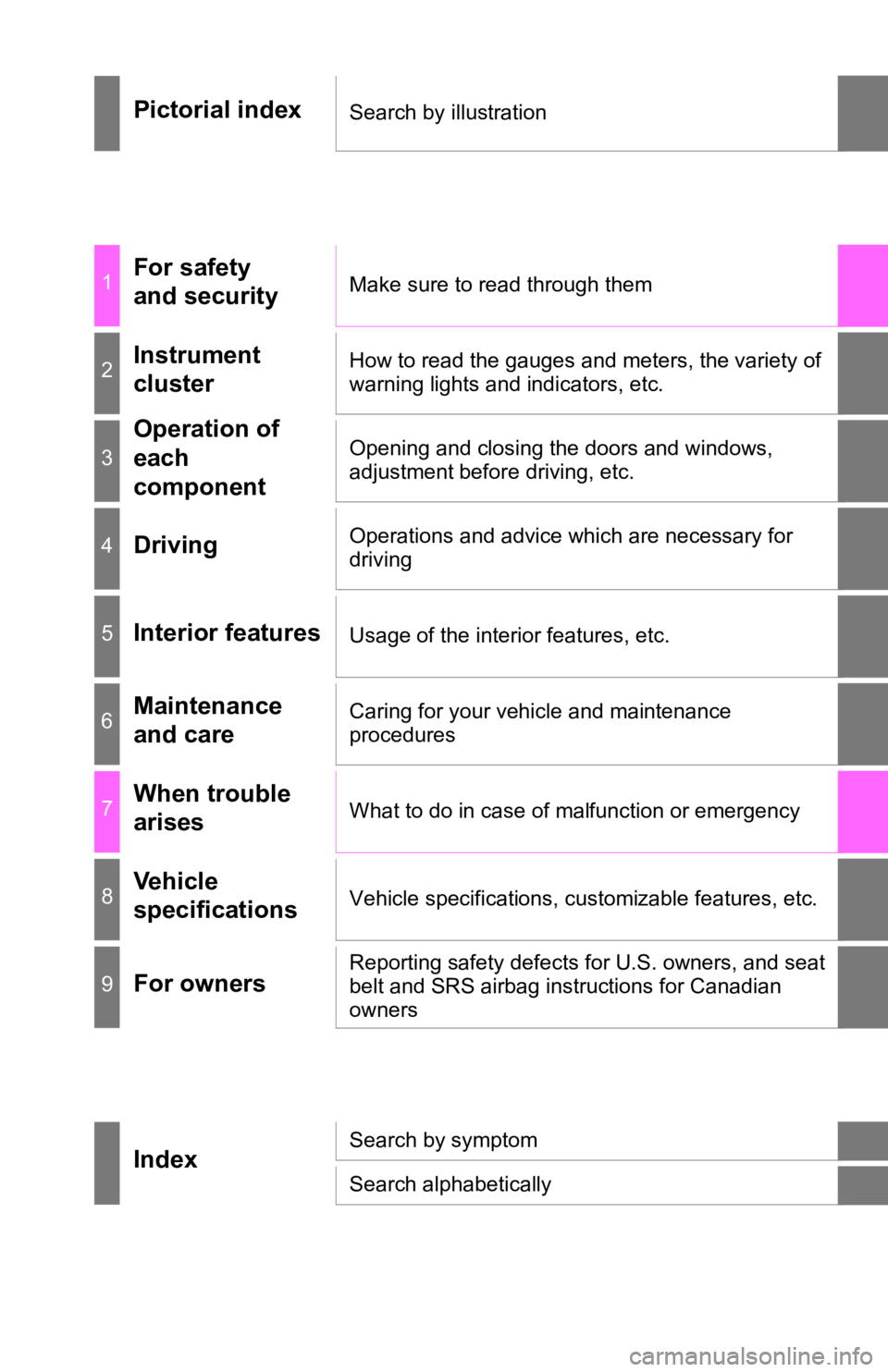
Pictorial indexSearch by illustration
1For safety
and securityMake sure to read through them
2Instrument
clusterHow to read the gauges and meters, the variety of
warning lights and indicators, etc.
3
Operation of
each
componentOpening and closing the doors and windows,
adjustment before driving, etc.
4DrivingOperations and advice which are necessary for
driving
5Interior featuresUsage of the interior features, etc.
6Maintenance
and careCaring for your vehicle and maintenance
procedures
7When trouble
arisesWhat to do in case of malfunction or emergency
8Vehicle
specificationsVehicle specifications, customizable features, etc.
9For ownersReporting safety defects for U.S. owners, and seat
belt and SRS airbag instructions for Canadian
owners
IndexSearch by symptom
Search alphabetically
Page 2 of 536

TABLE OF CONTENTS2
For your information....................... 8
Reading this manual .................... 12
How to search .............................. 13
Pictorial index .............................. 14
1-1. For safe useBefore driving ...................... 24
For safe driving ................... 26
Seat belts ............................ 28
SRS airbags ........................ 34
Front passenger occupant classification system ......... 48
Safety information for children ........................ 53
Child restraint systems ........ 54
Installing child restraints ........................... 58
Exhaust gas precautions ....................... 68
1-2. Theft deterrent system Engine immobilizer system............................... 69
Alarm ................................... 72 2. Instrument cluster
Warning lights andindicators ........................... 76
Gauges and meters ............. 82
Multi-information display ............................... 85
Head-up display................. 100
Fuel consumption information....................... 107
1For safety and security
2Instrument cluster
Page 6 of 536

TABLE OF CONTENTS6
7-1. Essential informationEmergency flashers .......... 416
If your vehicle has to be stopped in an
emergency ...................... 417
7-2. Steps to take in an emergency
If your vehicle needs to be towed ..................... 418
If you think something is wrong........................... 421
Fuel pump shut off system........................ 422
If a warning light turns on or a warning buzzer
sounds ............................ 423
If a warning message is displayed ..................... 433
If you have a flat tire .......... 438
If the engine will not start ..................... 450
If the electronic key does not operate
properly ........................... 452
If the vehicle battery is discharged ................... 455
If your vehicle overheats ........................ 459
If the vehicle becomes stuck................................ 462 8-1. Specifications
Maintenance data (fuel, oil level, etc.) .......... 466
Fuel information ................. 475
Tire information.................. 478
8-2. Customization Customizable features ....... 491
8-3. Items to initialize Items to initialize ................ 499
Reporting safety defects for U.S. owners ........................ 502
Seat belt instructions for Canadian owners
(in French)................................ 503
SRS airbag instructions for Canadian owners
(in French)................................ 505
7When trouble arises8Vehicle specifications
9For owners
Page 15 of 536
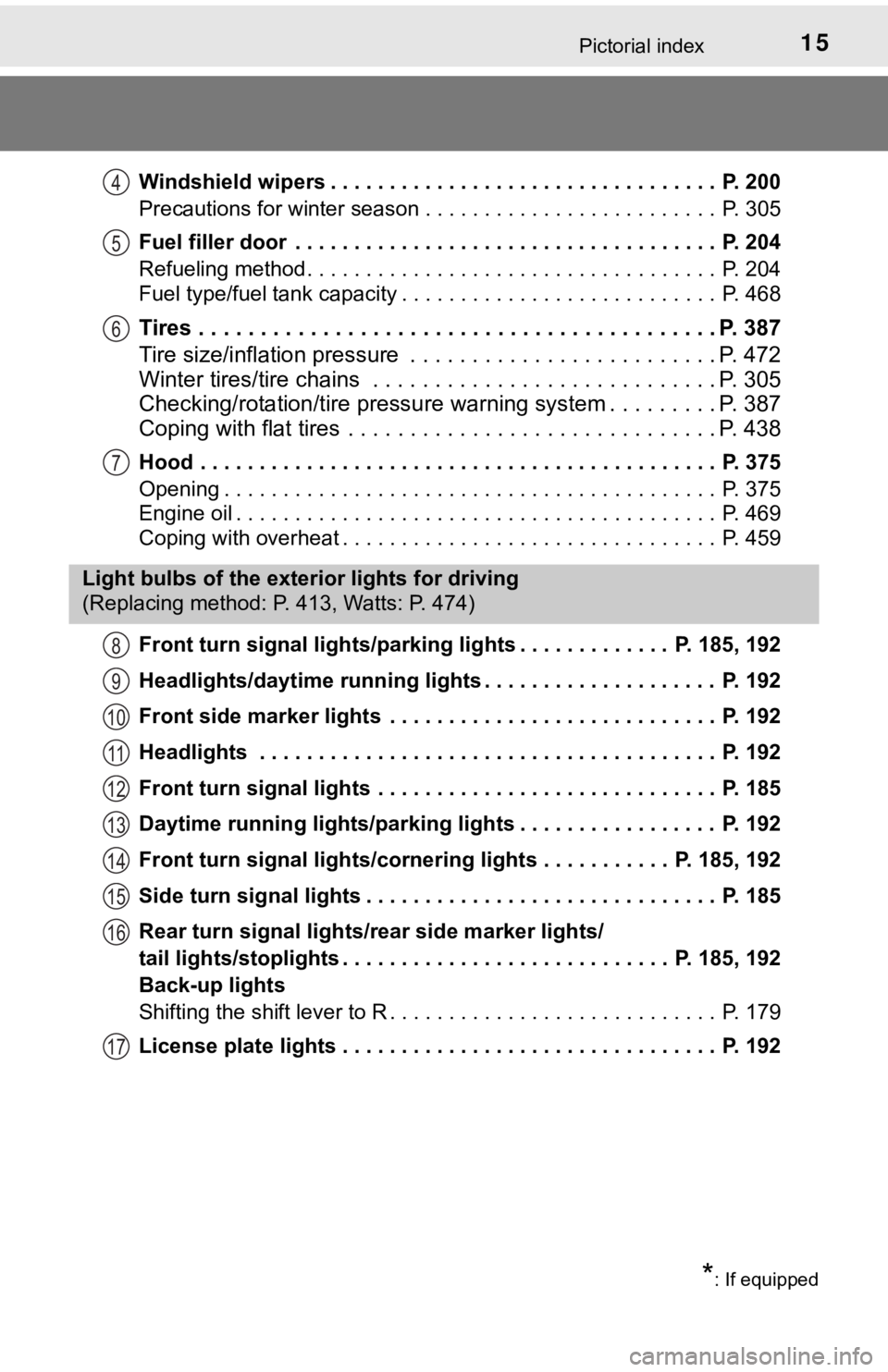
15Pictorial index
Windshield wipers . . . . . . . . . . . . . . . . . . . . . . . . . . . . . . . . . P. 200
Precautions for winter season . . . . . . . . . . . . . . . . . . . . . . . . . P. 305
Fuel filler door . . . . . . . . . . . . . . . . . . . . . . . . . . . . . . . . . . . . P. 204
Refueling method . . . . . . . . . . . . . . . . . . . . . . . . . . . . . . . . . . . P. 204
Fuel type/fuel tank capacity . . . . . . . . . . . . . . . . . . . . . . . . . . . P. 468
Tires . . . . . . . . . . . . . . . . . . . . . . . . . . . . . . . . . . . . . . . . . . P. 387
Tire size/inflation pressure . . . . . . . . . . . . . . . . . . . . . . . . . P. 472
Winter tires/tire chains . . . . . . . . . . . . . . . . . . . . . . . . . . . . P. 305
Checking/rotation/tire pressur e warning system . . . . . . . . .P. 387
Coping with flat tires . . . . . . . . . . . . . . . . . . . . . . . . . . . . . . P. 438
Hood . . . . . . . . . . . . . . . . . . . . . . . . . . . . . . . . . . . . . . . . . . . . P. 375
Opening . . . . . . . . . . . . . . . . . . . . . . . . . . . . . . . . . . . . . . . . . . P. 375
Engine oil . . . . . . . . . . . . . . . . . . . . . . . . . . . . . . . . . . . . . . . . . P. 469
Coping with overheat . . . . . . . . . . . . . . . . . . . . . . . . . . . . . . . . P. 459
Front turn signal lights/parking lights . . . . . . . . . . . . . P. 185, 192
Headlights/daytime running lights . . . . . . . . . . . . . . . . . . . . P. 192
Front side marker lights . . . . . . . . . . . . . . . . . . . . . . . . . . . . P. 192
Headlights . . . . . . . . . . . . . . . . . . . . . . . . . . . . . . . . . . . . . . . P. 192
Front turn signal lights . . . . . . . . . . . . . . . . . . . . . . . . . . . . . P. 185
Daytime running lights/parking lights . . . . . . . . . . . . . . . . . P. 192
Front turn signal lights/cornering lights . . . . . . . . . . . P. 185, 192
Side turn signal lights . . . . . . . . . . . . . . . . . . . . . . . . . . . . . . P. 185
Rear turn signal lights/r ear side marker lights/
tail lights/stoplights . . . . . . . . . . . . . . . . . . . . . . . . . . . . P. 185, 192
Back-up lights
Shifting the shift lever to R . . . . . . . . . . . . . . . . . . . . . . . . . . . . P. 179
License plate lights . . . . . . . . . . . . . . . . . . . . . . . . . . . . . . . . P. 192
4
5
6
7
Light bulbs of the exter ior lights for driving
(Replacing method: P. 413, Watts: P. 474)
*: If equipped
8
9
10
11
12
13
14
15
16
17
Page 16 of 536
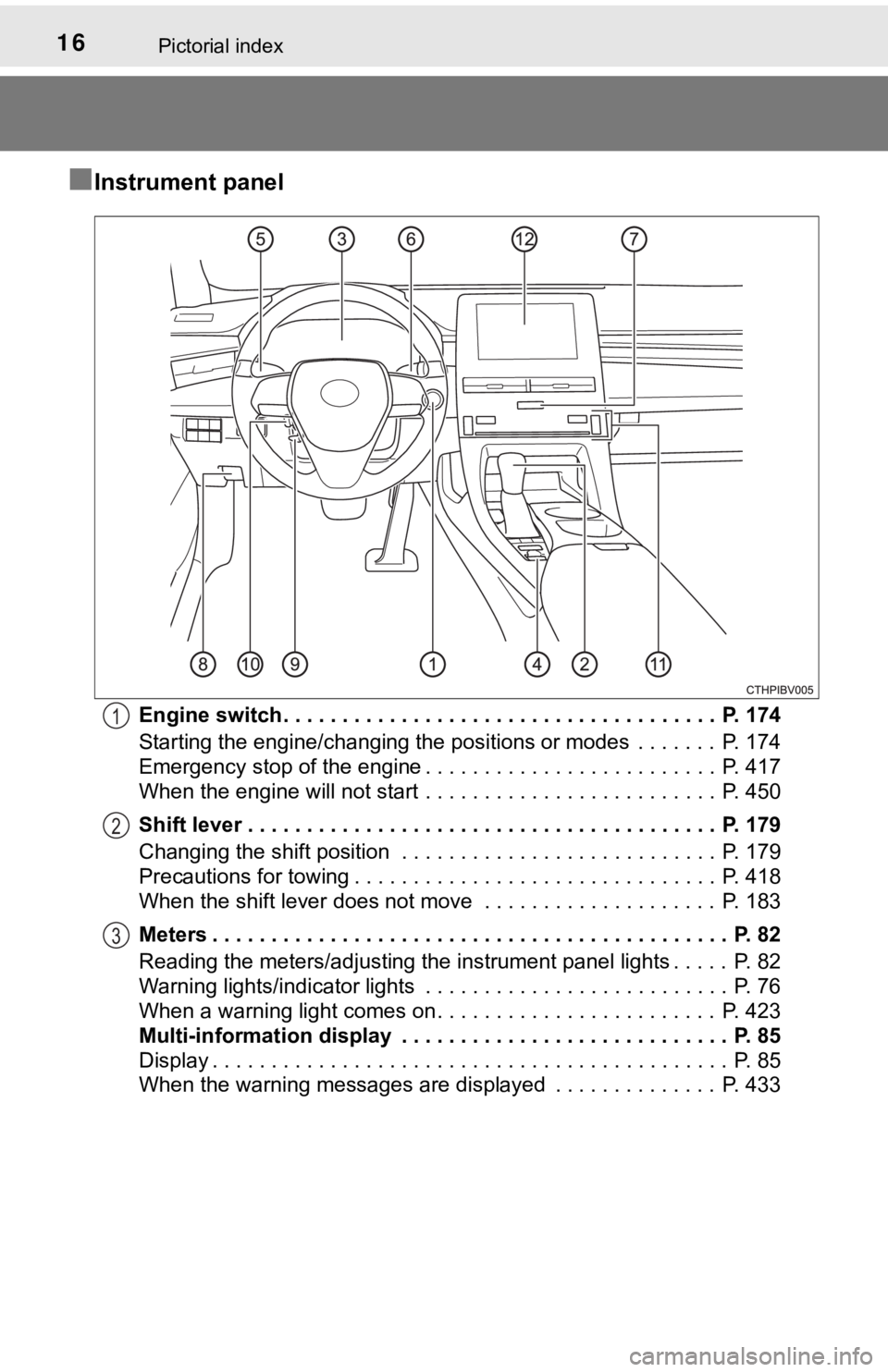
16Pictorial index
■Instrument panel
Engine switch . . . . . . . . . . . . . . . . . . . . . . . . . . . . . . . . . . . . . P. 174
Starting the engine/changing the positions or modes . . . . . . . P. 174
Emergency stop of the engine . . . . . . . . . . . . . . . . . . . . . . . . . P. 417
When the engine will not start . . . . . . . . . . . . . . . . . . . . . . . . . P. 450
Shift lever . . . . . . . . . . . . . . . . . . . . . . . . . . . . . . . . . . . . . . . . P. 179
Changing the shift position . . . . . . . . . . . . . . . . . . . . . . . . . . . P. 179
Precautions for towing . . . . . . . . . . . . . . . . . . . . . . . . . . . . . . . P. 418
When the shift lever does not move . . . . . . . . . . . . . . . . . . . . P. 183
Meters . . . . . . . . . . . . . . . . . . . . . . . . . . . . . . . . . . . . . . . . . . . . P. 82
Reading the meters/adjusting the instrument panel lights . . . . . P. 82
Warning lights/indicator lights . . . . . . . . . . . . . . . . . . . . . . . . . . P. 76
When a warning light comes on . . . . . . . . . . . . . . . . . . . . . . . . P. 423
Multi-information display . . . . . . . . . . . . . . . . . . . . . . . . . . . . P. 85
Display . . . . . . . . . . . . . . . . . . . . . . . . . . . . . . . . . . . . . . . . . . . . P. 85
When the warning messages are displayed . . . . . . . . . . . . . . P. 4331
2
3
Page 17 of 536
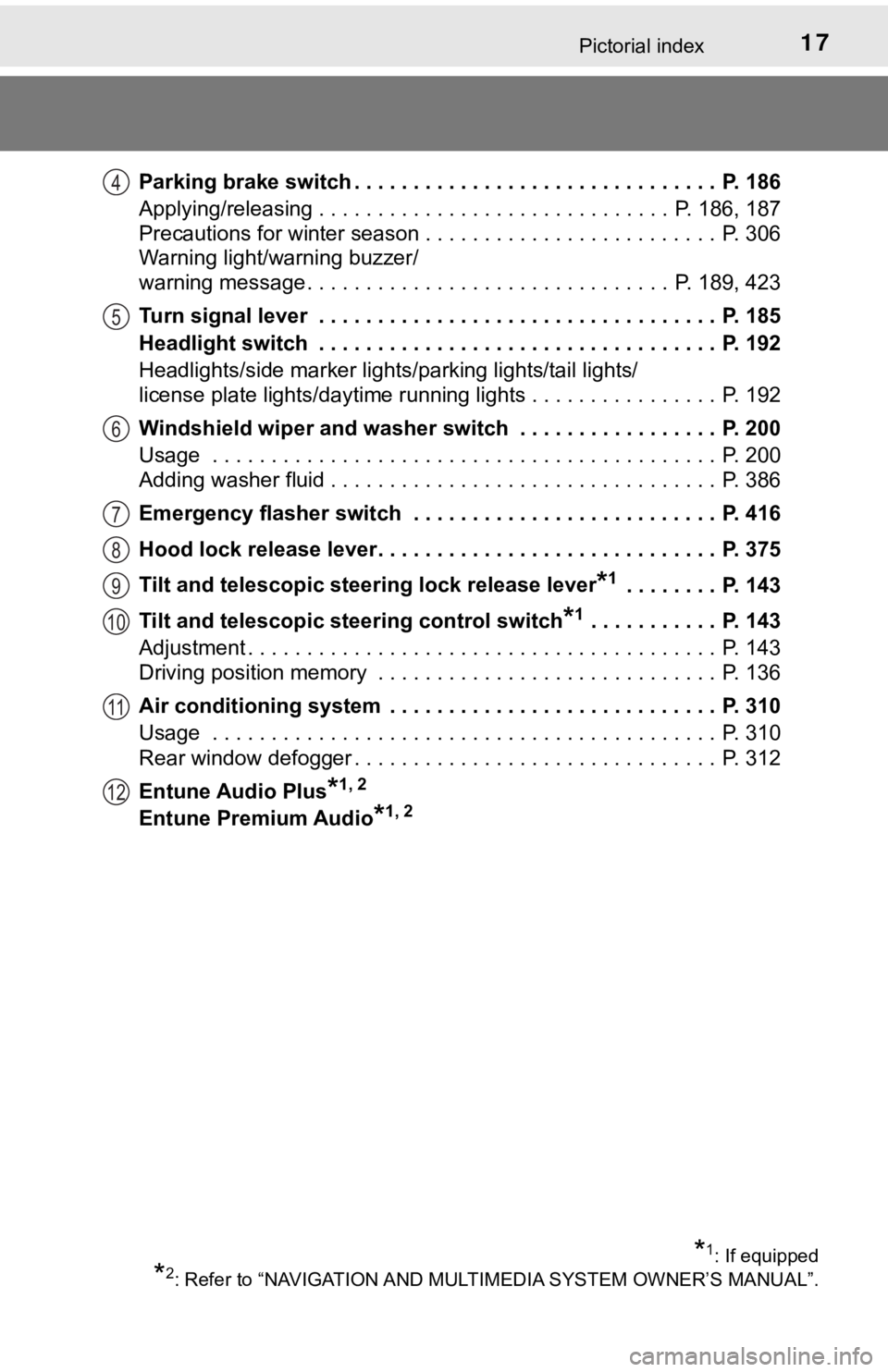
17Pictorial index
Parking brake switch . . . . . . . . . . . . . . . . . . . . . . . . . . . . . . . P. 186
Applying/releasing . . . . . . . . . . . . . . . . . . . . . . . . . . . . . . P. 186, 187
Precautions for winter season . . . . . . . . . . . . . . . . . . . . . . . . . P. 306
Warning light/warning buzzer/
warning message . . . . . . . . . . . . . . . . . . . . . . . . . . . . . . . P. 189, 423
Turn signal lever . . . . . . . . . . . . . . . . . . . . . . . . . . . . . . . . . . P. 185
Headlight switch . . . . . . . . . . . . . . . . . . . . . . . . . . . . . . . . . . P. 192
Headlights/side marker lights/parking lights/tail lights/
license plate lights/daytime running lights . . . . . . . . . . . . . . . . P. 192
Windshield wiper and washer switch . . . . . . . . . . . . . . . . . P. 200
Usage . . . . . . . . . . . . . . . . . . . . . . . . . . . . . . . . . . . . . . . . . . . P. 200
Adding washer fluid . . . . . . . . . . . . . . . . . . . . . . . . . . . . . . . . . P. 386
Emergency flasher switch . . . . . . . . . . . . . . . . . . . . . . . . . . P. 416
Hood lock release lever. . . . . . . . . . . . . . . . . . . . . . . . . . . . . P. 375
Tilt and telescopic steering lock release lever
*1 . . . . . . . . P. 143
Tilt and telescopic steering control switch
*1 . . . . . . . . . . . P. 143
Adjustment . . . . . . . . . . . . . . . . . . . . . . . . . . . . . . . . . . . . . . . . P. 143
Driving position memory . . . . . . . . . . . . . . . . . . . . . . . . . . . . . P. 136
Air conditioning system . . . . . . . . . . . . . . . . . . . . . . . . . . . . P. 310
Usage . . . . . . . . . . . . . . . . . . . . . . . . . . . . . . . . . . . . . . . . . . . P. 310
Rear window defogger . . . . . . . . . . . . . . . . . . . . . . . . . . . . . . . P. 312
Entune Audio Plus
*1, 2
Entune Premium Audio*1, 2
*1: If equipped
*2: Refer to “NAVIGATION AND MULT IMEDIA SYSTEM OWNER’S MANUAL”.
4
5
6
7
8
9
10
11
12
Page 32 of 536

321-1. For safe use
WARNING
■When children are in the vehicle
Do not allow children to play with the seat belt. If the seat belt becomes
twisted around a child’s neck, it may lead to choking or other serious injuries
that could result in death.
If this occurs and the buckle cannot be unfastened, scissors sh ould be used
to cut the belt.
■ Seat belt pretensioners
● Do not place anything, such as a cushion, on the front passenge r's seat.
Doing so will disperse the passenger's weight, which prevents t he sensor
from detecting the passenger's weight properly. As a result, th e seat belt
pretensioner for the front passenger's seat may not activate in the event of
a collision.
● If the pretensioner has activated, the SRS warning light will c ome on. In
that case, the seat belt cannot be used again and must be replaced at
your Toyota dealer.
■ Adjustable shoulder anchor
Always make sure the shoulder belt is positioned across the cen ter of your
shoulder. The belt should be kept away from your neck, but not falling off
your shoulder. Failure to do so could reduce the amount of prot ection in an
accident and cause death or serious injuries in the event of a sudden stop,
sudden swerve or accident. ( P. 29)
■ Seat belt damage and wear
● Do not damage the seat belts by allowing the belt, plate, or bu ckle to be
jammed in the door.
● Inspect the seat belt system periodically. Check for cuts, fray ing, and loose
parts. Do not use a damaged seat belt until it is replaced. Dam aged seat
belts cannot protect an occupant from death or serious injury.
● Ensure that the belt and plate are locked and the belt is not twisted.
If the seat belt does not function correctly, immediately conta ct your Toyota
dealer.
● Replace the seat assembly, including the belts, if your vehicle has been
involved in a serious accident, even if there is no obvious dam age.
● Do not attempt to install, remove, modify, disassemble or dispo se of the
seat belts. Have any necessary repairs carried out by your Toyota dealer.
Inappropriate handling may lead to incorrect operation.
● Always make sure the shoulder belt passes through the guide whe n using
the seat belt. Failure to properly position the belt may reduce the amount
of protection in an accident and could lead to death or serious injury in a
collision or sudden stop.
● Always make sure that the seat belt is not twisted, does not get caught in
the guide or the seatback and is arranged in the proper positio n.
Page 36 of 536
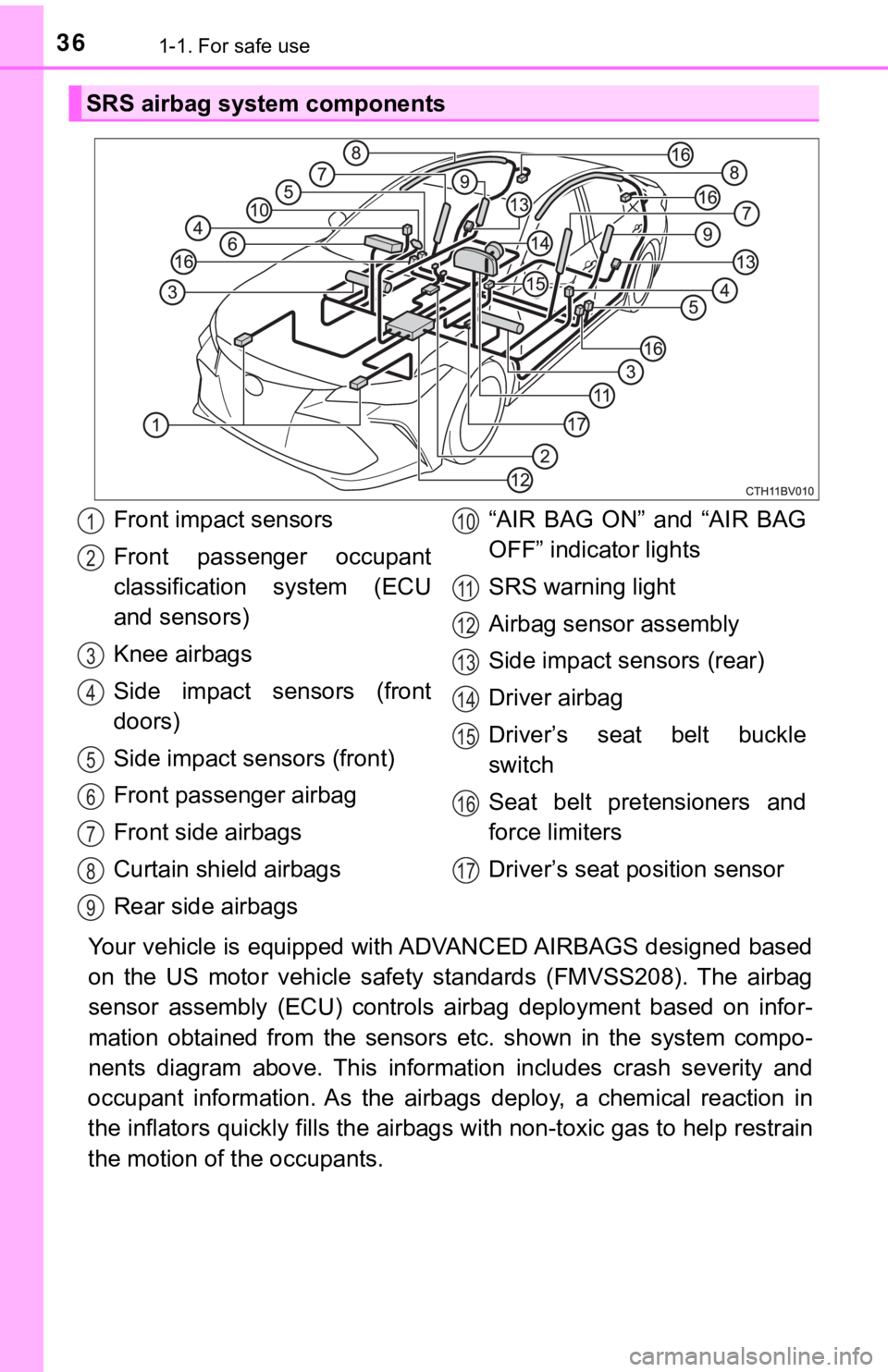
361-1. For safe use
Your vehicle is equipped with ADVANCED AIRBAGS designed based
on the US motor vehicle safety standards (FMVSS208). The airbag
sensor assembly (ECU) controls airbag deployment based on infor-
mation obtained from the sensors etc. shown in the system compo -
nents diagram above. This informat ion includes crash severity and
occupant information. As the airbags deploy, a chemical reactio n in
the inflators quickly fills the airbags with non-toxic gas to h elp restrain
the motion of t he occupants.
SRS airbag system components
Front impact sensors
Front passenger occupant
classification system (ECU
and sensors)
Knee airbags
Side impact sensors (front
doors)
Side impact sensors (front)
Front passenger airbag
Front side airbags
Curtain shield airbags
Rear side airbags “AIR BAG ON” and “AIR BAG
OFF” indicator lights
SRS warning light
Airbag sensor assembly
Side impact sensors (rear)
Driver airbag
Driver’s seat belt buckle
switch
Seat belt pretensioners and
force limiters
Driver’s seat p
osition sensor1
2
3
4
5
6
7
8
9
10
11
12
13
14
15
16
17
Page 37 of 536

371-1. For safe use
1
For safety and security
WARNING
■SRS airbag precautions
Observe the following precautions regarding the SRS airbags.
Failure to do so may cause death or serious injury.
● The driver and all passengers in the vehicle must wear their se at belts
properly.
The SRS airbags are supplemental devices to be used with the se at belts.
● The SRS driver airbag deploys with considerable force, and can cause
death or serious injury especially if the driver is very close to the airbag.
The National Highway Traffic Safety Administration (NHTSA) advi ses:
Since the risk zone for the driver’s airbag is the first 2 - 3 in. (50 - 75 mm)
of inflation, placing yourself 10 in. (250 mm) from your driver airbag pro-
vides you with a clear margin of safety. This distance is measured from
the center of the steering wheel to your breastbone. If you sit less than 10
in. (250 mm) away now, you can change your driving position in several
ways:
• Move your seat to the rear as far as you can while still reach ing the ped-
als comfortably.
• Slightly recline the back of the seat. Although vehicle designs vary, many drivers can achieve the 10 in. (250
mm) distance, even with the driver seat all the way forward, si mply by
reclining the back of the seat somewhat. If reclining the back of your
seat makes it hard to see the road, raise yourself by using a f irm, non-
slippery cushion, or raise the seat if your vehicle has that feature.
• If your steering wheel is adjustable, tilt it downward. This points the air- bag toward your chest instead of your head and neck.
The seat should be adjusted as recommended by NHTSA above, whil e
still maintaining control of the foot pedals, steering wheel, and your view
of the instrument panel controls.
Page 48 of 536
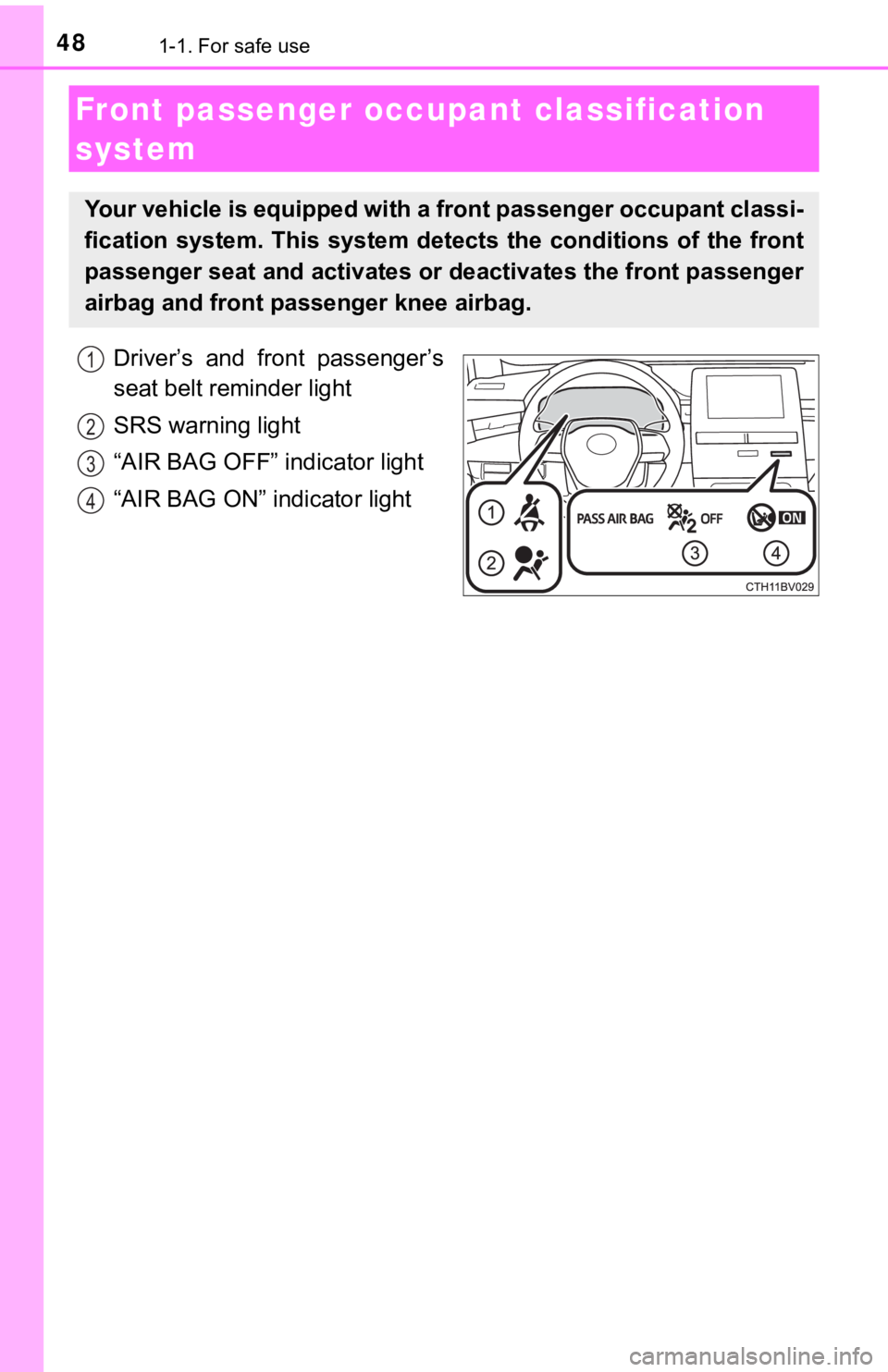
481-1. For safe use
Driver’s and front passenger’s
seat belt reminder light
SRS warning light
“AIR BAG OFF” indicator light
“AIR BAG ON” indicator light
Front passenger occupant classification
system
Your vehicle is equipped with a front passenger occupant classi -
fication system. This system det ects the conditions of the front
passenger seat and activates or deactivates the front passenger
airbag and front passenger knee airbag.
1
2
3
4